General Insurance Blogs, Articles & Updates by - Magma HDI
Have us call you
- RENEW YOUR POLICY
- BUY NEW POLICY
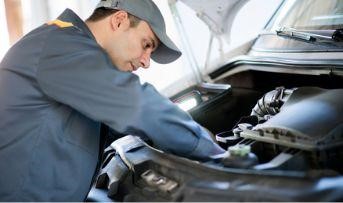
Know when and how you can get your car’s engine tune-up done
An engine is the core of our car, and you would want it to be in perfect shape every time you turn on its ignition. An engine tune-up consists of checking, diagnosing, and fixing minor problems that come up in the engine with regular usage of the car. This process includes checking the spark plugs, wires, distributor caps, air filters, oil filters, fuel filters and wiring, etc.
Regular engine tune-up helps extend your car's life and increase its efficiency. Let's understand how you can get your car's engine tune-up done.
When do you need a tune-up?
The odometer is the first and foremost thing that can tell us that your car's engine needs a tune-up. If your car has completed the minimum number of kilometres specified by the vehicle manufacturer, after which an engine tune-up becomes due.
Other signs that can indicate that an engine tune-up is required are lack of power and pick-up, decreased fuel mileage, erratic running, problem in starting, malfunctioning lights flashing on the dashboard, etc.
How can you get your car's engine tune-up done?
You should always go to an authorised service centre recommended by your car manufacturer for an engine tune-up. Any outside service provider or mechanic should never do your car's engine tune-up, as it may null and void the engine warranty.
The basic steps for an engine tune-up are as follows:
1. Replacing plugs and wires:
The first step in an engine tune-up is thoroughly checking the ignition system and its functioning. The spark plugs, coils, plugs, wires, and any other electrical part that helps in the car ignition are to be inspected.
For example, ignition wires can break down or wear out with usage. It can result in misfiring, performance loss, rough idling, and, eventually, making your car cylinder dead. Similarly, we need to check whether the ignition coils are in good shape and working properly. It can also lead to engine misfiring, poor acceleration, low fuel mileage, etc.
2. Filter change:
There are various types of car filters, such as oil filters, fuel filters, air filters, and cabin filters. Timely cleaning of filters is essential for improving engine performance and efficiency. If the filters are dirty, the engine will toil hard to get the required air, fuel, or oil, thus making it choked and perform poorly.
3. Belts and hoses:
All hoses need to be checked as they transfer vital fluids across the engine. Any disruption in the hoses will result in engine malfunction. Similarly, we need to check various belts that help the engine to run efficiently as they wear down, turn brittle, crack and eventually break with time and usage.
4. Right liquids:
For a car engine to perform perfectly, it needs a variety of fluids in perfect proportion, such as engine oil, coolant, brake fluids, power steering fluid, transmission fluid, etc. There is a regular change interval for each of the fluids. The change also depends on your car usage.
If you use your car regularly and run around a lot, you will need to change these fluids frequently and vice-versa. If you do not change these fluids timely, they can lead to engine malfunction and even breakdown.
Regular and timely engine tune-up is very important for keeping your car fit. It ensures that your car runs efficiently and its heart- the engine is in perfect shape. It also helps to increase the life of your car.
To address the car's safety, you must purchase a private car insurance India policy. It protects your car from any damage or loss that it may suffer from fire, theft, accidents, natural disasters such as earthquakes and floods, etc. It also provides coverage from third-party liabilities. Hence, you must choose the right insurance service provider to provide adequate coverage and protection in times of need.
Click HERE to buy private car insurance India.
Disclaimer: The information provided above is for illustrative purposes only. To get more details, please refer to policy wordings and prospectus before purchasing a policy.

Did you know that you can be charged a fine if found driving a car without mandatory accessories
Cars are almost our second home as we spend 2-3 hours daily commuting in them. Most of us love to go for different types of fancy car accessories available in the market. Accessories make our car ride comfortable and convenient. Also, they add style to the car and make it look sportier and cooler.
But, do you know that a few accessories are mandatory by law, without which you cannot drive on Indian roads and can be fined. Let us explain them to you:
1. High-security number plate:
High-security registration plate or HSRP is mandatory to be used on your car along with the colour-coded sticker that comes with it. We cannot install fancy number plates with fashionable fonts just to make our car look stylish and unique. HSRP has been made mandatory in India from 1st April 2019.
This number plate is made of aluminium and cannot be removed from a vehicle once installed. It also has a unique 10-digit permanent identification number (PIN), so it cannot be cloned or copied. If you do not have an HSRP on your car, you can be fined anywhere between INR 5000 to INR 10000, depending on your state. Also, repeat offenders can be charged a compounding fine of INR 5500.
2. Lights:
You will be surprised to know that there are rules regarding the various types of lights you use in your car. These lights include car headlights, sidelights, tail lights, and registration plate lights. According to the Motor Vehicles Act, functional headlights, sidelights, taillights, and registration plate lights are mandatory.
Non-functioning lights can make you go blind at night, or vehicles approaching from the other side may not see you. In either of the cases, you may meet with an accident. You can be fined if any of these lights are not working properly, as this can be hazardous for you and other vehicles on the road. .
3. Rear and side-view mirrors:
Rear-view mirrors are a mandatory accessory for your car as per sections 5 and 7 of the Central Motor Vehicles Act. You can be fined for not driving with a rear-view mirror. Similarly, police can penalise you if you drive around without side-view mirrors or if they are folded!
4. Horn:
Cars must have an electric horn that can warn other vehicles around them that they are approaching. Driving your car with a faulty horn can attract a fine of INR 500 for the first time and INR 1500 for every subsequent offense. However, the fine amount can vary from one state to another.
5. Wipers:
Wipers are essential because they are the key tools for visibility during heavy rains. Driving without wipers is illegal, and you can be fined for that. If you get stuck in heavy rain without a wiper, you will not be able to see anything in front of you clearly, and there will be a high chance of an accident.
You can have a long list of fancy accessories to make your car stand out from the crowd, however, you should not neglect the above list of mandatory accessories required by law. Travelling without them can attract fines and penalties.
Renewal of motor insurance timely is also mandatory by law. Driving your car for a day after your motor insurance expires is also illegal. Do not delay the renewal, as you can conveniently get online motor insurance renewal without visiting the insurance office. Be safe, be protected.
Click HERE to get the online motor insurance renewal.
Disclaimer: The information provided above is for illustrative purposes only. To get more details, please refer to policy wordings and prospectus before purchasing a policy.

Help your ageing parents tackle loneliness with these practical tips
While we live in a more digital world, it's natural for our elderly population to feel left out of meaningful conversations. Many young individuals also find themselves in the self-imposed isolation of the virtual system.
With age, bodily functions are hampered, and our elders don't have the energy as before. Their mental health also takes a toll and is impacted because of the fear of being unable to match with the current generation. The increasing age draws anxiety and health problems, making elders feel lonely and less productive. It is important to consider the elderly who may be alone and far from their children and other loved ones.
Do you have older parents at home? We have listed some measures you can take to lessen the loneliness your elderly parents may feel.
1. Get them out with people:
Social interactions decline with age. The seniors among us can attest to this truth more than anyone else. Their isolation can be alleviated by encouraging them to interact with others. Sometimes, interaction with new people might lead to lifelong friendships. Age shouldn't be a barrier to meeting new people and making new acquaintances. While making new friends is always exciting, a downpour of old memories comes with existing friendships.
Parents have lived longer, so it is natural for them to have lots of anecdotes to share. It just takes someone to listen for them to feel better. So, don't miss out on listening to their stories. Research shows that when seniors are provided opportunities for introspection, they report higher levels of satisfaction with both their lives and the world at large. By learning to control their feelings, they will become warmer, friendly, and, most importantly, less lonely.
2. Encourage for plant / pet:
You can lift seniors' moods and enrich their routines by gifting a plant or animal to care for, giving them a touch of responsibility and affection. In addition, there appears to be a correlation between senior citizens who keep pets and a lower incidence of health problems requiring medical intervention. Caring for plants at home or a nursery and looking after pets help keep the elders occupied with positivity and enjoy cheerful company.
3. Rely on experts:
Geriatric care managers can help seniors who don't have close family nearby. Typically, geriatric care managers are seasoned physicians or carers who figure out how to best meet the emotional and social requirements of their elderly patients.
Caregivers for the elderly spend the opportunity to get to know their patients, start friendly conversations, and engage them in mentally stimulating activities like games and mindful tasks like painting, singing, yoga, etc. Perhaps going for affordable health insurance plans for parents that may include professional services and additional health benefits should be your priority.
4. Communication:
Communicate often with your ageing loved one and engage them in conversation. Your close family member might appreciate more frequent phone calls from you. Communication is the best way to bond with your elders and make them feel valued.
5. Remind them of their importance:
Inviting them to join in on the festivities is a great way to show them how much they mean to you. Inspire them to reach their potential, but avoid giving the impression that any help you provide stems from a sense of obligation on your part. Express your affection for them and let them know that they will always be an important member of your family.
Loneliness doesn't pose an immediate health risk. Therefore, some people might not take the possibility of it seriously. While isolation might not seem like a problem, it can become one if left unchecked. Elders usually don't open up about the problems they face so easily with their family members. Studies and statistics show that the elders are more likely to require hospitalisation, so you must do everything you can to keep them in a positive frame of mind and reward them with affordable health insurance plans for parents to ensure their wellbeing.
Click HERE to buy the best and affordable health insurance plans for parents.
Disclaimer: The information provided above is for illustrative purposes only. To get more details, please refer to policy wordings and prospectus before purchasing a policy.
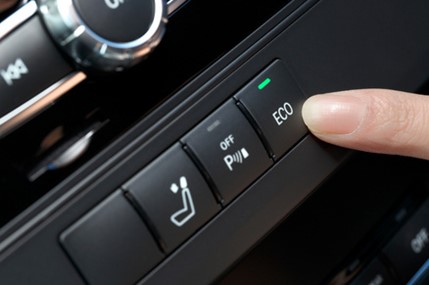
Apply these ten efficient measures to drive smartly and save fuel
Fuel prices are soaring daily in most Indian states and have a cascading impact on the public. Owning an EV or electric vehicle is still a far-fetched dream for most of us because of its unaffordability due to high prices and the absence of charging infrastructure across the country.
The price of CNG or Compressed Natural Gas has also touched all-time highs making it unviable to replace vehicles running on conventional fuel, i.e., petrol and diesel. So how do we save fuel and, eventually, our hard-earned money?
Let us go through some efficient measures to drive smartly and save fuel.
1. Accelerate smoothly:
Never accelerate suddenly since the engine uses maximum fuel when it achieves speed from being stationary. Therefore, the harder we accelerate, the more fuel it consumes. Make it a habit to accelerate gently, helping the car steadily gain speed. Always go easy with your car!
2. Drive in economy mode:
Most cars nowadays come with an economy or eco mode that maintains a balance between fuel efficiency and speed. Also, drive below the speed of 80-90 kmph, which is considered the ideal speed limit to achieve and maintain fuel efficiency. Anything over it will result in a higher fuel burn rate and a lower average per litre.
3. Manage your gear shift wisely:
Driving your vehicle in the right gear can help you save considerably on fuel. You put undue pressure on the engine if you drive in the wrong gear, resulting in higher fuel consumption.
4. Maintain correct tyre pressure:
Always maintain correct tyre pressure as under-inflated tyres resist proper rolling, putting more pressure on the engine. This will lower mileage, burning a hole in your pocket in the long run.
5. Use air-conditioning wisely:
A vehicle’s air-conditioning system burns up much fuel, resulting in lower fuel efficiency. Avoid using the air-conditioning system when your car is stationary or idle for a long time. Switch off the AC and roll down the windows when possible. Use the re-circulate option in your vehicle while using the AC.
6. Use your car wisely:
You can save fuel even by being smart in using your car. Do not make unnecessary and multiple trips to the supermarket all day. Prepare a list of things you need to buy, and when your list is big enough, go and get them. Also, go for carpools. It will be wise for four or five colleagues to carpool if the route permits, go together to the office, and divide the fuel cost rather than everyone going by their personal vehicle.
7. Ditch the extra weight:
Travel light. Ensure your boot is not full of unwanted stuff that adds weight to your car. Also, remove the carrier when it is not in use. Driving light can help you be more fuel-efficient.
● Anyone running a business with a steady stream of customers coming in and out of the building daily.
● Corporation owners who attend to numerous clients each day.
Following are the types of burglary insurance available under the general insurance India category.
8. Use “Fastag”:
Make use of a “Fastag” while driving on a highway. With it, you can cross a toll booth in a few seconds, helping you save on fuel.
9. Use “cruise control”:
Use the “cruise control” feature in your car, especially while driving on a highway. This will help you to maintain a constant speed without needing to push the accelerator constantly, giving you much better fuel efficiency.
10. Avoid idling:
Switch off your engine whenever you have to make a stop for over 20 seconds. Switching off and restarting will consume less fuel than your engine being on while your car is stationary.
Apply these efficient measures to drive smartly and see how you save fuel and eventually money over a few days. You can also buy the best car insurance to get complete protection at low premium rates and comprehensive car insurance benefits. Be smart, save money, and choose the best!
Click HERE to buy car insurance and insure your car with reliable coverage.
Disclaimer: The information provided above is for illustrative purposes only. To get more details, please refer to policy wordings and prospectus before purchasing a policy.
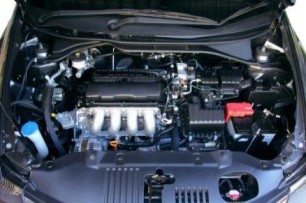
How different types of car engines impact insurance costs
Owning a car is not an easy task. You need to check the car features, mileage, prices, road safety, inner functionalities, maintenance, and servicing are a few things on a very long list. And one of the most critical points on this list is insurance. It would be best if you keep up with the premiums and renewal dates. Not everyone has sufficient information about insurance before they purchase it. This is why you must gather all the pointers from your insurance provider or agent before exploring your options.
Are you looking to purchase insurance and trying to understand the options? Are there any differences based on the type of car you own? Well, this blog is all about how different types of car engines impact insurance costs and will help you gain better insights about car insurance before you get one or switch your insurance policy.
1. Let’s discuss different engine sizes:
A car engine has two main parts: a few cylinders and a piston. And as we are aware of the combustion process where the fuel goes through the burning process in the cylinder. This provides sufficient energy for the piston to function, and through various connected mechanical systems, the generated power helps you drive the car.
Car engines are segregated according to the fuel volume of the cylinders. They are classified as under 1.0-litre, 1.0 to 2.0-litres, 2.0 to 3.0-litres and 3.0-plus. Diesel engines have a similar classification, except there will be no car with a less than one-litre engine capacity.
2. How do different engine sizes impact your insurance costs:
The power of your car majorly depends on the size of your engine. If your vehicle has a big engine, it is considered powerful. And this ultimately means that your car insurance will come under the higher tab/group. And if your insurance group is on the higher end, your insurance is bound to be expensive in most cases.
Exceptions to the size point discussed above are cars with turbocharged engines. These engines are extremely powerful and packed. Hence, they are smaller in size. A machine with a one-litre capacity today will usually be turbocharged. But since it provides a power-packed performance, the turbocharged engines are expensive, which raises the price of your insurance too. However, check with your car insurance company if your policy covers turbocharged engines.
3. What does it mean to have a powerful car:
Chances are that if your car comes under the category of powerful vehicles, it has an engine that delivers high and fast performance and reaches top speeds within seconds. Thus, there is a prediction that the thrill might make you more vulnerable to road accidents, making your car more prone to damages you will claim on your insurance policy.
This cycle raises the price of your insurance because the compensation for your claims about your powerful car will be bigger too. A similar process goes with expensive cars. The fancy technology, the sky-high prices, and the threat of your expensive vehicle getting stolen push the cost of your insurance.
But other factors are involved in determining your insurance and premium prices, including your driving history. Look for the best car insurance company in India that provides premiums and benefits perfectly matching your requirements.
And while we are discussing car insurance, claims, and premiums, you need to understand the importance car insurance holds. Especially if your car ends up being part of an accident or unfortunate circumstances, insurance will come in handy to keep you financially stress-free. At the same time, you focus on getting your vehicle fixed and resolving the situation. So, you must purchase your car insurance from the best car insurance company in India.
Click HERE to learn more about the benefits of the best car insurance company in India.
Disclaimer: The information provided above is for illustrative purposes only. To get more details, please refer to policy wordings and prospectus before purchasing a policy.

Are you confused between different versions of the same car while buying? Here's our guide
We all have noticed that whenever a brand launches its new car, there are different versions/variants. These variants have additional features and are placed at different price ranges. The base model is set at the starting price, while the top model takes away the cake by being priced higher. But why do these companies launch variants of the same car model and provide different features?
While purchasing a car, you need to look at various resources to educate yourself about different brands and their cars, your budget, the features you want, and the type of car you want. Are you finding it difficult to arrive at a final decision about which car you want to buy? Or have you finalised the model of the vehicle but are confused about the variant? Here's our guide. This blog will answer this question and provide sufficient information to make an informed decision.
1. There are multiple versions of a car. Why?
Car manufacturers have been creating different versions of a car. The term" variant" refers explicitly to a specific vehicle version. Car manufacturers prefer this method to market their products and distribute the needs of different sections of people. This way, they attempt to persuade their target audience for a particular vehicle and are forced to buy a variant on the upper end from what they initially set out to purchase. The distribution of features is finely done, targeting to expand the car's sales potential.
There is absolutely no fixed number of variants when it comes to the automobile industry. Car manufacturers can launch any number of variants of the same car model and tweak the features strategically to lure in the customers. The variants usually depend on the popularity of the car model, the brand, the consumer loyalty and the brand's reputation and accountability, etc.
2. The number of different features you should look for.
As we discussed earlier in the introduction, other parts in the variants of a car model lead to the difference in the price range. And these price ranges determine which car is under your budget and more accessible to you. But what are some of the features you as a customer should be on the lookout for?
Interior material:
There might be differences in your car's interior from the model in the high ranges. You will notice differences between the seat cover of the variants, and the personalisation options provided might seem limited too if you compare with the cars on the higher end.
Safety always comes first:
Every car today usually comes with several airbags, increasing as you go towards the higher-end variants. Apart from that, many safety features are incorporated into all vehicles in the current times. But the level of safety aids might differ in the car variants and models. Base level cars provide the standard features while vehicles in the higher end comes with premium safety features, which creates the allurement in the market.
Other determining features to look forward to are engines, fuel efficiency, mileage, navigation systems, and other technologies. So, take a wise decision to decide between the different versions of the same car that fits your budget and requirements. The prices are rising, and there seems to be no relief anytime soon. Therefore, in unpredictable times, you need to safeguard your crucial assets like cars with insurance.
Purchase car insurance to ensure you are one step ahead and can focus on resolving the situation. Also, remember, as there are different models and variants of cars available in the market, there are several car insurance options with different prices. You must determine the best car insurance price in India and invest in a comprehensive coverage plan.
Click HERE to learn more about the best car insurance price in India.
Disclaimer: The information provided above is for illustrative purposes only. To get more details, please refer to policy wordings and prospectus before purchasing a policy.

Best tips for choosing the right motorcycle for seniors
Many people love riding motorcycles. It's fun, daring, and adventurous. Whenever we talk about bike fanatics, we imagine a young adult riding a motorcycle with cool bike gear, taking a long trip in an aesthetically beautiful location. But, are motorcycles only for the youth?
Senior citizens also love riding bikes. But when it comes to the type of bikes they should go for, you must take care of certain factors given their age, mental conditions, body, fragility, accidental risks, road conditions, driving skills, etc. Are you looking for advice on how to help the seniors in your family take up their hobby while ensuring they stay safe? This blog will provide tips for choosing the right motorcycle for seniors. Let's dive in.
1. Ensuring the body to be fit to ride:
The number of senior citizens' road accidents has been rising worldwide. They are likely to get seriously injured or even die in bike crashes. Senior citizen accidents rose by almost forty percent, and the leading causes are a lack of protective gear like helmets, driving at high speed, and drinking and driving.
All these three reasons are against the road safety regulations, and one must consider this before getting a bike for the senior member of their family. Some other reasons for aged people to be prone to road accidents include vision impairment, sensory delay, reduced reaction time, balance and alignment issues, reduction in brain size, weakness, lack of bone strength, etc.
One must keep these factors in mind before you help the senior citizens hit the road on their own. If there are any such issues, you need to ensure their safety and consider the best options like accompanying them on the exact vehicle, being around whenever they drive, setting limitations of driving if the senior member is comfortable with it, etc.
2. Picking the right motorcycle and getting back to practising:
First and foremost, you must consider all possibilities and risks before going out to get a bike. Safety comes first. You need to purchase a motorcycle that suits and prioritises their driving skills, size, handling capacity, and security.
Some things you need to take care of include their height and weight, which have changed over the years and are still variable. Their size should be enough to operate all the controls and set their foot on the ground so they can control the bike whenever there is a sudden need. Their weight also should be able to handle the body and design of the bike. The weight of the senior member would determine their ability to manoeuver the bike quickly and efficiently. So, you need to ensure that you get a lightweight bike for them so that they can operate and balance it easily, even on uneven terrains. Maintaining bike control is essential for yourself and others on the road.
If not, it can potentially cause dangerous accidents leading to severe consequences. And last but not least, you need to help them plan their itinerary if they choose to go for a trip, and help them practice in a nearby area with decent roads, which would also help a beginner.
Those were some of the best tips for choosing the right motorcycle for seniors. The senior family members have the right and freedom to live their passion of biking and enjoying their retired life. If you are an older person, then just follow the above tips and encourage yourself to set out on short leisure rides or long adventurous trips.
But during any of these daily or weekend activities, the unpredictability on the road is always a concern. So, to ensure that even if you end up in difficult circumstances which can potentially cost you a hefty amount, you should buy the best two wheeler insurance in India to ensure that you focus on getting your ride fixed instead of fixating and worrying about finances. Get your gear, wear your helmet, and get ready to hit the road again!
Click HERE to know more about the best two wheeler insurance in India.
Disclaimer: The information provided above is for illustrative purposes only. To get more details, please refer to policy wordings and prospectus before purchasing a policy.
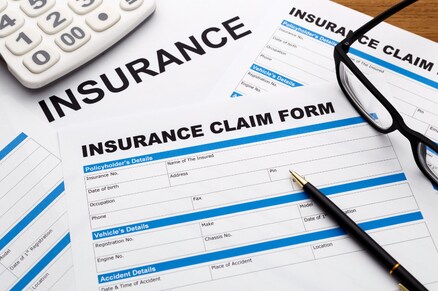
Here are the important steps you can follow to appeal a health insurance claim denial
If you are suffering from health issues and other illnesses, health insurance is crucial in covering the expenses for treatment and medicines. A safety net in the form of health insurance can take a significant load off yourself and your family. However, it can be nerve-wracking if your health insurance claim does not go through. An insurance claim can be rejected for various reasons, and depending on your insurance provider, they may or may not provide clear reasons why the claim was denied.
So, if you are worried about claim denials and want to know the next steps that need to be done, this article is for you.
What are the reasons for claim denial?
There can be many reasons why the insurance company may reject your claim. Upon receiving a claim, the insurance company cross-checks every document from the policyholder to verify the policy's validity and the claim's authenticity. Some of the significant reasons for claim denial are issues with the cover. There is a list of illnesses and treatments that insurance doesn't cover. If your claim falls under such a category, the insurance company can reject your claim. Other reasons could be missing information, expired validity, and lack of supporting documents.
How can you rectify and reapply?
If you are eligible to reapply, you should thoroughly go through every document and ensure that there is no missing information and that all the supporting documents are attached. After providing these documents, you can reapply for your insurance. However, if the reason for prior rejection was an expired policy, then you cannot reapply for the insurance. The validity period of your policy is the only contract holding the insurance company accountable to you. If a claim was made without an active policy, the insurance company is authosied to reject the claim.
How to write a letter of appeal to the insurance company?
This is probably one of the easiest and most effective ways to undo claim rejection. Write an appeal letter to the insurance company stating facts and attach supporting documents to strengthen your case. Papers such as treatment plans, medical bills, etc., are some examples of the supporting documents that you can use. If your claim looks valid to the insurance providers, they will approve them immediately.
Who is an ombudsman, and how can they help?
If none of the steps mentioned above works, you should consider going to an ombudsperson to review your claim. An ombudsman is an officer appointed by the government for the policy holders' fair disbursement of insurance money. Any grievance against an insurance company can be made to an insurance ombudsman. If your insurance claim was rejected or the company has not responded to your appeal, then the ombudsman is responsible for resolving the issue.
After careful consideration, the ombudsman recommends a settlement or an award that must be complied within the next fifteen to thirty days.
These are a few things you can do to ensure that your health insurance claim is approved. Health insurance claim rejection is not something that you need to stress about. Understanding why the plea was rejected and rectifying the issues will help you reapply for health insurance. Insurance companies must be careful against fraudulent claims, which is why they have stringent policies to disburse the insurance amount to the rightful people.
Before buying your health insurance in India, read all the papers carefully. Understanding the terms and conditions before purchasing your policy ensures that you have no trouble at the time of claiming the insurance. Analyse your requirements and opt for a tailor-made policy for you to reap the benefits of health insurance.
Click HERE to know more about health insurance in India.
Disclaimer: The information provided above is for illustrative purposes only. To get more details, please refer to policy wordings and prospectus before purchasing a policy.

Let's understand the working of car rental insurance
In the modern era, cars no longer remain a luxury. Instead, they have come under the list of essentials. While a four-wheeler is crucial for ease, accessibility, and comfort while travelling, it's not always possible to buy one on your own due to the heavy expenses. However, rental cars are the perfect solution.
While we're on the topic of rental cars, it is essential to understand rental car insurance as well. If, unfortunately, you end up in an accident during your driving, insurance will provide you with the right added protection and coverage. Now let's understand the working of rental car insurance.
1. There are different types of rental car insurance. You can select the one which caters to your needs best:
• Personal accident protection – It offers medical cost coverage for you and your co-passengers in case of personal injuries.
• Loss and Damage Waiver (LDW) – It is also called the Collision Damage Waiver (CDW). Rather than being a proper policy, this is a waiver scheme that prohibits the rental company from chasing after you in case of damage or if the vehicle is stolen.
• Supplemental Liability Protection – This provides cover against the damages done from your end.
• Personal effects coverage – This ensures coverage against personal items getting stolen from your rental car.
2. If you don't have auto insurance, it is advisable to get rental car insurance. A non-owner car insurance policy covers only liability. So, it is advised that you purchase damage protection. In addition, driving without car insurance is illegal, and you can get heavily fined if you do so.
3. Your personal policy does not cover the repair cost if you get into an accident and end up damaging the car. Therefore, think about purchasing a Loss and Damage Waiver (LDW) if you lack a collision and comprehensive coverage on your personal auto insurance policy.
4. Rental insurance is also beneficial if you're renting a car for a business trip or personal travel and are unsure about personal auto insurance coverage limitations.
5. Depending on personal car insurance to protect against the damages caused to the rental car can land you into paying a deductible. Instead, buy rental car insurance, which covers the cost of repair and avoids paying a deductible.
6. The cost of rental car insurance depends on several factors. It relies on the company you purchase the coverage from, the type of car you are renting, the state you are in, and the number of miles/kilometres you are travelling. Your costs will also increase if you purchase add-on coverages.
Now that we have taken a closer look at the working of rental car insurance, a wise option would be to think about your car and its protection against unanticipated damages. The best part about this whole process is that you can explore your options and buy car insurance policy online that suits your needs without any hassle. Travel without worry and explore the places you want to visit using an affordable commutation option and multiple insurance benefits.
Click HERE to know more about how you can buy car insurance policy online.
Disclaimer: The information provided above is for illustrative purposes only. To get more details, please refer to policy wordings and prospectus before purchasing a policy.

Apartment living vs. Independent housing: Which choice to make
Owning a house is a dream that most of us wish to turn into reality. We come across pictures of beautiful properties and aspire to own one of them at some point in our lives. However, zeroing down on the house in downtown areas of the city can be an expensive deal. In a country like India, where the population growth is exponential, vertical housing or apartments are inevitable. Over the past decade, we have seen an increasing trend of housing societies and sky-high buildings making their way around the town.
This trend is more prevalent in metros or tier-one cities because of the rising working population. Therefore, buying an independent property in such a city requires an exorbitant price, forcing a second thought. However, the records for a smaller city present a different story, where people still have the ability and the assets to choose independent living and prefer doing the same.
Let's individually understand the perks of both apartment living and independent living and then leave a choice for you to take.
Benefits of apartment living:
Apartments these days are primarily built-in clusters within a housing society where several families reside with all the facilities such as supermarkets, gyms, pools, playgrounds, personal parking spaces, etc. People prefer this form of housing because it ensures easy accessibility, round-the-clock security, regular maintenance, orderly garbage disposal, and an overall community experience that boosts social connectivity.
Another reason why people prefer a pre-built house is because the total cost comes out to be way less than building a house right from laying the bricks. A significant hassle of building a house from scratch is the cost of the plot, legal formalities and clearances, and setting up electricity and water connections. So, choosing to go with apartments makes it more convenient and stress-free.
However, apartments come with a set design, and there is only so much you can do to make changes, which would add up to a surplus amount at the end of the day.
Benefits of independent housing:
Independent housing is ideal for those who enjoy living on their terms. While constructing your house independently, you will be able to choose the design and layout. You can customise the size and the number of rooms. The inbuilt design, windows, balconies, or terrace can all be according to your preference.
People interested in gardening can also benefit a lot from the space around the house. Independent houses ensure more privacy, as these don't share common walls, and there is a significant distance between two consecutive houses. Another huge benefit is that, over time, these kinds of properties fetch a lot of value. Land value is skyrocketing these days, so owning land and a house on it is a massive investment with great returns.
So these are a few benefits of both kinds of housing. House is a place you will call home eventually, so giving a reasonable amount of time and making the right choice that fits your lifestyle is essential. The choice between independent houses or apartments is yours to make, but opting for the best home insurance in India should be non-negotiable as it adds value to your home, may it be an apartment or a bungalow.
Click HERE to learn about the best home insurance in India.
Disclaimer: The information provided above is for illustrative purposes only. To get more details, please refer to policy wordings and prospectus before purchasing a policy.

How do self-driving cars work, and how will they impact in shaping the future?
Self-driving automobiles, previously thought to be a sci-fi fantasy, are now cruising the streets in some parts of the world, but there's a catch. They are not yet capable of reaching the benchmark of human drivers. Using the most sophisticated 3D imagery and Artificial Intelligence, car manufacturers want to provide users with a hands-free experience without jeopardizing personal safety. In today's post, we speak about the technology behind these cars and how they influence the future of mobility.
How exactly Self-driving automobiles work?
When the driver selects a destination into the car's navigation system, the software determines a route and drives the car towards it by tracing the route map. A revolving sensor mounted on the roof monitors a 60-meter radius surrounding the vehicle and generates a dynamic 3-D representation of the surroundings.
A sensor on the left rear tyre detects lateral movement to determine the vehicle's position to the 3-D map. Another couple of radar sensors in the front and rear bumpers calculate obstacle distances. The car's AI software is linked to all sensors and receives data from Google's Street View and integrated video cameras. Artificial Intelligence then mimics human perception and handles driving systems like steering and braking.
The vehicle's software constantly checks Google Maps & built-in GPS to be aware of landmarks, road signs, and lights. An override feature allows the drivers to take over the control of the vehicle whenever they want.
Now that you know how a self-driven car works. Let's look at its possible impact on our future.
1. Settlements:
People generally settle near their workplaces to avoid spending the time commuting daily. However, with self-driven cars, people will have extra time for other activities and personal leisure time as they won't have to drive, which means that they will no longer need to settle as close to the workplaces as before.
2. Fewer Accidents:
We know most accidents occur due to human errors. With no humans behind the wheels, there's no possibility of human error resulting in fewer accidents.
3. Mobility for disabled and elderly:
Differently abled people and the elderly will no longer have to depend on others to drive for them. They can just hop in and start navigating.
4. Fewer traffic jams:
Most traffic jams occur due to the congestion of the vehicles on the roads. Everyone wants to get ahead and, in the process, disrupts a free flow of traffic. Self-driving cars can cut down traffic by multiple folds. Sophisticated software and radars will have a sophisticated driving pattern.
5. Less human touch:
A self-driven car is all about software and sensors. They can never be 100% accurate and lack emotions and feelings. The inability to adapt quickly combined with a lack of emotions can have adverse impacts.
The possibilities for driverless cars are endless, and the imagination is at the top among car manufacturers. However, self-driving technology is not yet fully developed. It will take up a significant amount of time, and legal obligations before autonomous vehicles dominate the roads.
Till then, it's time to focus on what we have at hand. May it be a self-driven car or a non-autonomous car, safety always remains an important aspect for both the categories. And, when the safety of assets is concerned, insurance is the solution. So, as we talk about future technologies, why not consider purchasing online car insurance by making the best use of the internet and online resources for a hassle-free buying experience.
Click HERE to know more about online car insurance plans.
Disclaimer: The information provided above is for illustrative purposes only. To get more details, please refer to policy wordings and prospectus before purchasing a policy.

Understand these four things before you modify your two-wheeler
Bikes are never out of fashion, and every biker wants his favourite bike to be the show-stopper. You may have seen a lot of tastefully customized bikes and may be interested in modifying your two-wheeler. Different people have different reasons for customizing their motorcycles. Some do it for better designs, while others do it to improve performance or safety.
No matter the reason, here are four things that you should know before you shift into high gear and head straight to one of the bike modification shops.
1. What The Motor law says:
When considering change, the first thing to examine is if the law allows it. To illustrate, if you wish to update the engine to boost its power output, your registration certificate should reflect such modifications. As a result, you must go to the Regional Transport Office and have your registration certificate updated. Minor cosmetic changes, such as adding a sticker, are permissible without clearance. Each state has its own set of rules regulating the use of lights, indicators, license plates, and horns. Before making any changes to your bike, you must comply with the government's regulations, or you'll have to pay a heavy fine. Ensure that you stay lawful!
2. Types of Modifications and their Impact on premiums of 2 wheeler insurance:
Performance-based modification: Performance enhancements on two-wheelers often involve fuel-efficient technologies or mechanisms to enhance speed. Remember, a higher speed increases the probability of an accident. Given the danger, it will surely raise your 2 wheeler insurance premium.
Aesthetic modification:When you modify your bike to look more aesthetic, it raises the chances of theft, thus increasing the premium.
Safety modification: By adding security features to your bike, you reduce the chances of bike theft. As a result, you save money on insurance costs too.
Modifications for the disabled:If a specially-abled person rides a bike and is modified to meet the convenience, the insurance provider will not charge an additional premium.
3. Inform your insurance provider:
Keep your insurance company informed of any alterations you want to make to your two-wheeler. Some two-wheeler changes may result in an increased premium amount. Failure to disclose these modifications may be seen as unlawful, leading to claim denial by the insurer.
4. Get the job done by a professional:
While the potential for heavy-duty modifications to two-wheelers is restricted, you can still make many alterations. Paintworks, for example, are still permitted as long as they are within the RTO guidelines. Similarly, the installation of minor extras such as decals, visors, and engine fairings remains allowed. Make sure that only specialists perform these tasks.
Remember, your bike is a machine, and like any other machine, it has its limitations. Therefore, you need a skilled bike modifier who can assess your bike's capabilities, consider your needs in terms of adjustments, and then begin working on a plan.
Whether you modify your vehicle or not, you must hold valid insurance if you want to ride your two-wheeler lawfully on Indian roads. Also, you need to prepare yourself for uncertain events or situations like accidents, maintenance fees, and other service costs involved before they take a toll on your finances. So get reliable 2 wheeler insurance and forget all the stress.
Click HERE to know about the most economical plans for your 2 wheeled companion.
Disclaimer: The information provided above is for illustrative purposes only. To get more details, please refer to policy wordings and prospectus before purchasing a policy.

Festival sale! How to get a good deal for a new bike
It is the festive season in India, the perfect time for family get-togethers, mini-vacations and the excitement of shopping! Irrespective of the socio-economic factors and the varied buying habits of customers, Indians dominate the world in their crazy obsession with shopping.
And this creates an excellent business opportunity not only for the wholesalers but also the retailers. With super busy markets, sales reach new heights, and people begin to recognize themselves as shopaholics. But we can't blame them, can we? With all the exciting deals around, no one will be able to resist the urge to buy things.
And, so it seems like a pleasant occasion to buy the new bike you have wanted for a long time now. In this article, we will assist you in getting an excellent deal for the new bike you wish to bring home this festive season.
1. Evaluate different options: Check out all the options available to you, as the same bike might be available at different prices across different showrooms. Evaluating alternatives and substitutes always result in a better price. Compare the offers that all the showrooms or private dealers have for you during this festival. Always go for offers with a monetary discount and not just some freebies.
2. Do not rush, take it slow: Take your time to do things your way. People always have a fear of missing out. 'Last day' and 'limited stocks' are a few of the many things dealers say to make you swipe your cards. Also, don't stress if the festival ends. Often the sellers extend the offer for the next few days. If you miss Ganesh Chaturthi, there is always a Navratri sale, and the following is a Dhanteras offer, not to forget about the Diwali season. So, the bait of 'last chance, hurry up!' is not for you to fall prey to.
3. Payment mode of smart finances: We often neglect the payment mode thinking it does not make a huge difference, but it does. If you pay close attention, you will notice that net banking charges, credit and debit cards, or a payment application are different for different brands and dealerships. Certain bank cards provide you with an extra 5% or more discount. Making a cash payment at the counter might also earn you a concession. So do not overlook all these aspects if you want to grab the best deals that don't loosen your pocket much!
4. Beware of fake deals: Many dealers trick you by hiking prices just before the season starts and then provide discounts, making no difference in your price. Do not fall for freebies! Not all of them are useful. And if they attract you, you will only end up gathering a load of unwanted items.
Bike insurance will always be a necessity when you buy a new bike. Even the insurance companies flash exciting offers and unique festive benefits to attract potential customers. You can check the BIKE INSURANCE ONLINE, compare the deals of multiple companies, and buy the one offering the best value-for-money.
Do you think is it fair to select products solely based on their price? Sure, money matters, but so do standards and features. It is safe to do some market research beforehand to bring good fortune for you this festive season. Look beyond the offer and also focus on the specifications of the bike you decide to buy. That is how you make a real deal.
Planning to buy bike insurance online for your brand new bike? Click HERE to get the best deals.Disclaimer: The information provided above is for illustrative purposes only. To get more details, please refer to policy wordings and prospectus before purchasing a policy.

Five ways you can stay healthy at your workplace
Is working 9-5 taking a toll on your health? Sometimes we involve ourselves so much in work that we forget to pay attention on our health. Unfortunately, it commonly happens to every other working person. And even though we try our best to bring a balance, we somehow end up neglecting our health.
Most people blame their jobs for not being in good shape. However, it is no news that most of the population works in offices and remains at their desks for about 9-10 hours a day.
Such a lifestyle looks manageable while you’re young, but as you grow old, it starts to have terrible consequences on your health, including back pain, eye strains, stress, neck syndrome and those extra calories adding up to obesity.
Go through these five tips to find simple ways to balance your health and work simultaneously.
1. Drink adequate amounts of water and have healthy meals:
Pay proper attention to how much water you consume while at work. It is essential to stay hydrated throughout the day for an active mind and body. Similarly, eating a healthy lunch is an equally important part of a balanced diet. Make salads and fresh fruits a part of your meals. Eat reasonable portions and do not skip lunch. Avoid nibbling on snacks while working.
2. Frequent breaks:
Make sure you take a 5-10 minute break every 2 hours. Do not confuse yourself by thinking a break is a waste of time. On the contrary, you must consider it as a way to be more productive. Sitting at a place for too long can make you less productive. Just like any system, your body needs time off to keep performing in a better condition.
3. Hygiene and cleanliness of your workplace:
Your computer keyboard, mouse, and telephone can be a harbour for those germs just waiting to get you sick. Beware of your surroundings, ensure cleanliness and proper hygiene of your workplace. For instance, your desktop or laptop needs to be regularly cleaned. Use disinfectant, keep sanitizing wipes handy to clean the surface of your workplace and table often.
4. Follow a workout routine:
One of the good things you can do to stay healthy and in shape is exercise. Squeeze in a workout routine in your daily schedule as much as possible. Exercising for at least thirty minutes is recommended for keeping the best shape and health. Walking for a few minutes during lunch is also a great idea. Find a walking partner in the office whom you can join in for a daily walk.
5. Get a good health insurance:
In today’s world of stressful lifestyles, it is very important to have your health backed up by health insurance. Some companies have even made it mandatory for their employees to have one. Look for online health insurance, choose the best that fits you and purchase online health insurance without hesitation.
People always tend to turn a blind eye towards their health and end up prioritizing work over health. Take a note of the above valuable tips to ponder on staying healthy when at work. Work has no alternative, nor does health, so be wise and have health insurance backup.

Things to Know Before Buying a Health Insurance Plan for Your Family
Maintaining your fitness might be a controllable factor, but predicting medical help indeed isn't. And we already know that the enormous hospital bills can suck up all of your savings, making you wish you had a health insurance plan.
There is no doubt that the benefits of an insurance policy are precious and useful at crucial times. However, with a sea full of policies out there, it can get tough to make a decision. To ease this, we've listed some critical aspects to consider before you buy Health Insurance Online in India:
● Determine Age-Related RequirementsOne of the most significant and primary aspects while buying health insurance is your age. Determine your and your family members' age before you proceed towards your purchase. Generally, the premium payable to individual plans depends on the age of the oldest member of your family. Another element is that many plans come with certain limitations in terms of the age for entry. While some allow age limits up to 60 years, others only cover up to 50 or 55 years. Likewise, the age for entry also depends on the type of policy you choose, while some permit newborns with 90-95 days and others start from age like 20 or 25 years. There might also be some policies that don't limit their coverage based on age-related factors. A piece of advice would be to check and verify the age limit when it comes to buying your health insurance.
● Determining Premium & Coverage Related Factors Many consider lower premium plans to be more favorable as there are fewer expenses involved. On the contrary, the lower premium plans have lower coverage period. The next time you see a policy with a low premium, try to verify the reasons. Look out for any different payment sources dated for future dates, restrictions; this will help ensure that you won't pay a great deal of money when you claim your policy. As far as there are no such additional costs or limitations on the coverage, you're good to go.
● Agreements On The Waiting Duration A waiting duration is where the insured person must wait for a particular duration due to prevailing health conditions like blood pressure, arthritis, thyroid, and more. Being well acquainted with the duration given by your policy can help you make the appropriate decision. Generally, the waiting duration ranges from 1 to 2 years or more, depending on each policy provider.
● Advantages Correlating To Hospital Bills The best part about buying a health insurance policy is that you don't have to pay any hospital bills as the insurance company directly sends out your coverage amount to the hospital. However, one thing to determine is that this coverage is only listed under individual hospitals; not all hospitals are part of their system.
However, can you imagine the number of form fillings and other tedious formalities that you can skip once you buy health insurance online in India?
● Coverage Benefits Before And After Your Hospitalization While you're looking at a specific type of insurance plan that primarily covers your hospital bills, make sure you check the coverage benefits. What you're missing out on are policies that cover hospital bills and the expenses associated before and after your treatment like physical check-ups, physiotherapist sessions, and more. When you pay for a policy, isn't it essential that you get all the benefits you'd admire? Save your medical expenses fully!
● Coverage Benefits Before And After Your Hospitalization While you're looking at a specific type of insurance plan that primarily covers your hospital bills, make sure you check the coverage benefits. What you're missing out on are policies that cover hospital bills and the expenses associated before and after your treatment like physical check-ups, physiotherapist sessions, and more. When you pay for a policy, isn't it essential that you get all the benefits you'd admire? Save your medical expenses fully!
● Coverage Benefits For Pregnancy One of the aspects that everyone misses out on is checking whether your policy covers medical bills related to your pregnancy. And you'd certainly be surprised to know that a lot of them don't. Also, many policies that cover this type of expense hold a waiting duration ranging from anywhere between 2 to 4 years. You can also plan your pregnancy accordingly.
Final words
Plan your policy ahead of time and consider what aspects are fundamental to you. This can certainly save you a lot on medical bills.
Quick tips:
● Navigate & Compare: These are the two primary things to consider before buying a health insurance policy.
● Check all the necessary related benefits.
● Ensure that the list of network hospitals are close to your vicinity.

Important things to know before you set on a cruise trip
The sea has always opened up numerous opportunities for humankind. And now, with cruises becoming popular in the travel culture, people want to avail this luxurious and unforgettable adventure. Sailing from one horizon to another, experiencing the waters, foreign sunsets, and the regal amenities of the ship, make a complete package and a perfect bullet on your bucket list.
Planning a cruise trip can be intimidating and overwhelming. Ships are now as high as six to ten storeys and can contain upto three thousand passengers! You'll come across people from various cultures and backgrounds when visiting different port cities and countries. With expansive breathtaking views of the ocean, enjoy the vibes of a unique vacation far away from the city crowd and hassle. Cruise companies make every effort to make the guests feel welcome and curate experiences that cater to all travellers' expectations.
In this article, we will discuss some essential things to know before you set out on a cruise trip.
1. Windowless cabins:
For first-time cruisers, this can come as a shock. Some rooms may look like a coach in a train (size), but they might not have a window. These cabins are small spaces and can be congested for some. If you are uncomfortable in tiny spaces, make sure you check the amenities before booking a room. You can always travel with a partner to split the cost of the room if the price is too high.
2. Dress codes:
Some cruises have strict dress codes for mealtimes. You can be turned away if you don't adhere to the code and show up in ripped jeans or anything that comes off as casual. Make sure you prepare yourself in advance, enquire about these rules and regulations, and pack your outfits accordingly.
3. Book a higher cabin:
If you get seasick, booking a higher cabin will help you have a fun trip without the stress of feeling nausea or seasickness. Consider your health as a priority while sailing. Carry all necessary medications along with you and take good rest. The more you look after your body, the better you will enjoy your trip.
4. Last-minute upgrades:
Amenities like bigger beds, rooms, complimentary spa services, rooms with balconies, etc., become available at reasonable prices and deals if they are not sold out by the time the ship sets sail. Check the last-minute offers, upgrade, and avail of the luxuries if you like a discount.
5. Pricey internet:
Phone companies slap you with high roaming charges if you keep using your data without checking the roaming prices or switching to roaming data packs. Most ships have Wi-Fi options for basic tasks like emailing, online meetings, etc. Check with your travel group while looking for Wi-Fi hotspots.
Now that we have discussed some essential things you should know before setting out on a cruise trip, it would be wise to insure your travel as well. Cruises are expensive and can be risky if you don't get your trip insured in case of some unprecedented situations. These can be very stressful monetarily. To avoid this, explore general insurance plans in the market and choose the travel plan which suits your needs.
Click HERE to learn more about general insurance plans
Disclaimer: The information provided above is for illustrative purposes only. To get more details, please refer to policy wordings and prospectus before purchasing a policy.

The best tips to survive exhausting flights
'Travel' is often associated with beautiful views, fantastic food, and comfortable hotel stays. Yet, one of the lesser talked about things is the exhaustion one faces during the commute from home to the destination. Delayed flights, crowded lounges, and expensive food are just some of the many things we go through once checked in for the flight. However, airports need not be so stressful. Today we will look at some of the ways to survive exhausting flights and enjoy your flight.
1. Reach on time:
This is a no-brainer. If you are travelling domestically, reach at least two hours before. Many airlines these days have made web check-in available for passengers. So you can skip the long check-in lines and book your seat preference while opting for web check-in.
2. Breezing through security:
Security checks are one of the most dreaded procedures at the airport. A helpful tip can be to keep your laptop, mobile, and wallet handy to save you time in the queue. Another trick is to carry a clear bag to put them all in and then put that bag inside the tray. This way, your things are safe, and you can easily collect them back.
3. Carry an empty water bottle:
Staying hydrated is key to navigating through hectic airports and transit schedules. Water is generally not allowed during security checks, and buying from the airport can be expensive. Instead, carry a water bottle, and once you are through security, fill your bottle through the free water coolers available inside the airports.
4. Light cabin luggage:
Many of us have the habit of stuffing our cabin luggage. But remember that you have to carry your things for the next hour or so, and it can be worse if you are hopping flights. Sometimes there also might be a last-minute gate change, and running across the airport with heavy luggage would be a hassle. Therefore, it is best to pack light. Carry only essentials like water, snacks, and hand sanitisers in your handheld luggage.
5. Wear warm and comfortable clothes:
Wearing comfortable clothes while travelling is essential. The flight cabin can become extremely cold, and freezing for hours does not sound like a good idea. Besides, if you're taking a long flight, you might want to sleep.
So being in comfortable clothes can help you sleep better. Don't forget to carry an eye mask and a travel pillow to make the best out of the in-flight sleep.
6. Carry entertainment:
Waiting for flights can be a long and boring process. Make use of the free Wi-Fi at the airport and download shows, your favourite playlist of songs, and books you enjoy on your device. You can use them during your flight or while waiting to board.
These are a few tips and tricks that you can follow to make your trips less exhausting. Remember that any hiccups you face during travelling are part and parcel of nomadic life. What you can do is to be as prepared as possible. But to err is human, which is why you should invest in general insurance India so that the next time you travel, you are safeguarded against any extra expense and mishaps like damage or loss of luggage, etc.
Click HERE to know about general insurance India.
Disclaimer: The information provided above is for illustrative purposes only. To get more details, please refer to policy wordings and prospectus before purchasing a policy.
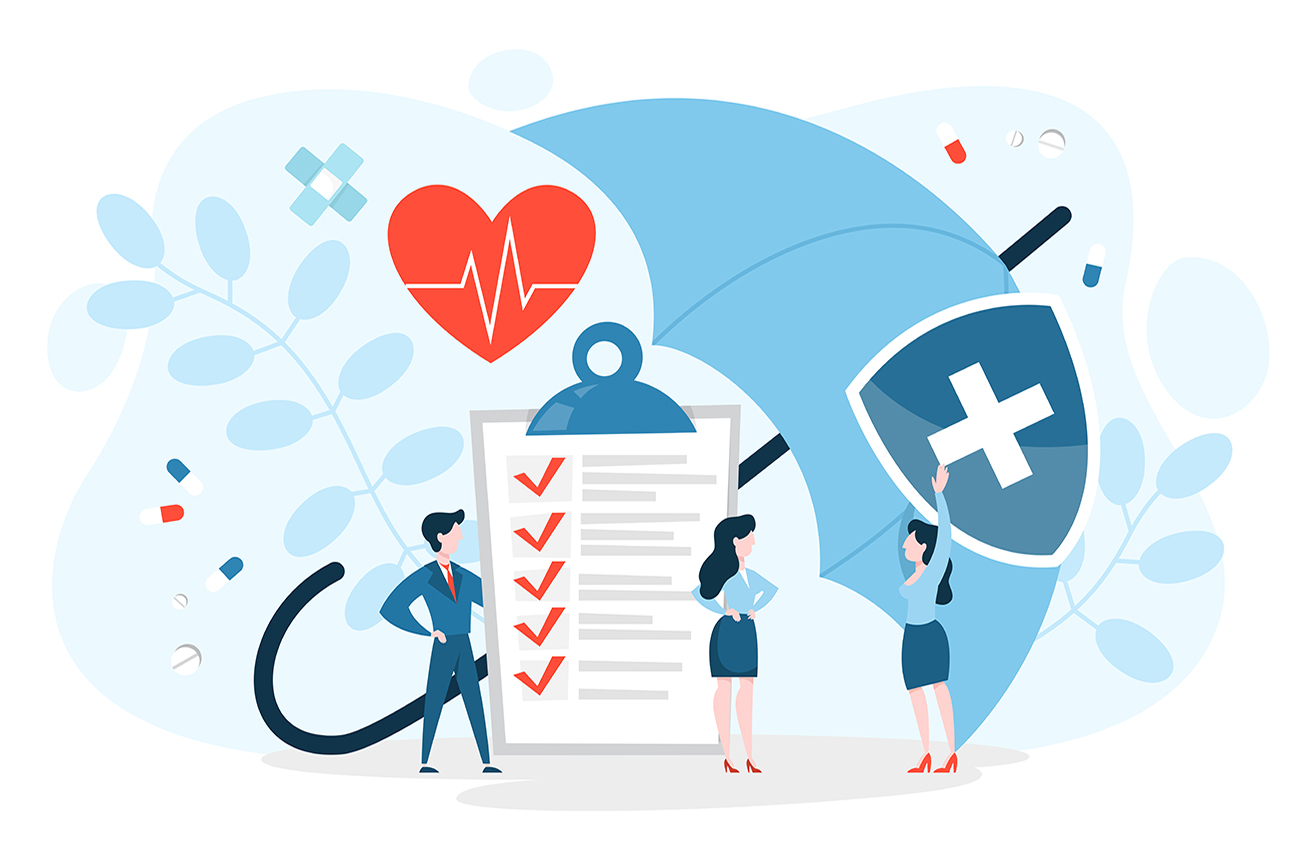
Why do you need health insurance in India?
We’re always talking about how densely populated India is but have you ever stopped to think what it means for us? Well, the metros are over-crowded for one, but there is more.
It also means more people have to share the same amount of resources. Something as basic as healthcare becomes more expensive for most.
Our country’s total expenditure on health as per WHO statistics was 4.7% of our GDP (2014). This cost is only rising due to our sedentary lifestyle and the external factors like climate that we expose ourselves to on a daily basis. As much as we love our junk food and comfortable chairs, they really aren’t helping our health.
So, at a time like this, what can one do?
This is where health insurance comes in handy, even if we faced the same health problems as the generations before us, the prices we would have to pay would be a lot more due to inflation. But a good health insurance can work as a safety net that protects you from these expenses. There are things such as family medical history, environment and even our lifestyles that aren’t completely in our control, but how prepared are we for unforeseen events are.
But besides countering the effects of our changing lifestyles and rising medical costs, health insurance also gives you some additional benefits such as tax deductions. We know, a lot of people don’t invest in health insurance because they think it’s expensive but if anything, it’s helping you save money on two fronts – medical bills and taxes. All payments made as premium for your insurance are eligible for tax deduction under section 80D of the Indian Income Tax Act. In simpler terms, the amount you pay as premium is deducted from your total taxable income.
Now you might be thinking that you are healthy, and you wouldn’t really need hospitalisation and thus, health insurance. But here’s where you are mistaken. Health insurance doesn’t just help you during hospitalisation but throughout – from getting free health check-ups to day-care treatments and even dental procedures. Now, who doesn’t need a dentist every now and then, right? Moreover, you might be healthy now, but what about 10 or 20 years down the line? You can never be sure of your health then, but you can be sure that health insurance will be there to protect your finances.
Planning for the future is a must in this day and age. The ease of technology leaves you with no excuse but to click a few buttons to secure yourself. Health insurance is cited as one of the best investments that one can make. Not only does it lead to better financial planning, but it also removes a lot of questions you may have when an unfortunate situation does arise.
Choose a plan tailored to your needs and stay assured that if you ever need healthcare, you have something to fall back on.
Though there are many Online Health Insurance Companies in India, Magma HDI is a one stop shop for all your needs from a Health Insurance Policy Renewal or getting a new policy.
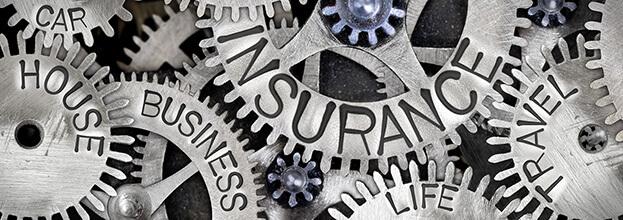
Everything you need to know about engineering insurance
Does your business rely heavily on machines and equipment? If yes, then you surely must’ve heard about machinery breakdown insurance. Even if you haven’t, worry not, we’re here to explain
Businesses that have machines running day-in-day-out are susceptible to loss if there is any physical damage to the machines or if they break down. Even if the daily wear and tear are monitored, it is impossible to predict a breakdown. But what you can do is be prepared for such situations by having a machinery breakdown insurance.
What is covered by this type of insurance?
Loss or damage due to:
- A mechanical breakdown
- An electrical breakdown
- Accidental external factors
The cover is applicable:
- When the machinery is operating
- When it is at rest
- When it is in the process of getting dismantled
- When it is being overhauled or subsequently being re-erected at the same premises.
The machinery breakdown insurance that we provide also has the following additional covers:
- Air Freight
- Express Freight
- Insured’s own surrounding property
- Third party liability
- Escalation
- Additional custom duty
What is not covered by this type of insurance?
Loss or damage due to:
- Natural calamities like lightning, flood, earthquake, landslides, etc.
- Burglary or theft
- Damage caused due to impact by land-borne/water-borne craft.
- Wear and tear, faults or defects that existed when the insurance period started and was either known to you or ought to have been known to you.
- Faults or defects for which the supplier is responsible either by law or under contract
- War or war-like operations
- Wilful acts or gross negligence on your or your representative’s part
- Accidental loss or damage due to overload experiments or tests requiring the imposition of abnormal conditions
- Loss of or damage to the different types of belts, ropes, chains, and other exchangeable tools
- Loss of or damage to objects made of glass, porcelain, ceramics, all operating media, etc
- Flaws, defects, cracks or partial fractures that develop gradually in any part not necessitating immediate stoppage
Machines and equipment form an integral part of some businesses. If your business is one of them, then you definitely must own insurance that protects your machinery against unforeseen circumstances. Specific insurance policies such as this one are made to ensure that if something does go wrong, business owners have a reliable option to fall back on.

Health insurance v/s critical illness insurance: All you need to know
There’s an ongoing debate between the importance of health insurance and critical illness insurance. Most people either confuse health insurance with critical illness cover or consider it to be an option. While both insurance plans act as a financial cushion for health-related contingencies, let’s learn the truth about both:
| Health Insurance | Critical Illness Insurance | |
|---|---|---|
| Scope | Provides overall benefit in terms of medical and hospitalization cost. | Provides lump sum amount in case of critical illnesses, such as cancer, stroke, heart attack, multiple organ transplant, etc. |
| Coverage | Covers pre and post hospitalization expenses due to a medical conditions or accidents, domiciliary treatment, day care procedures, etc. | Covers specific diseases. The payout can be used for treatment expenses, repay debts, accommodate lifestyle changes, etc. |
| Premium | Since the scope of coverage is higher, the premium amount is also comparatively higher | Since this covers specific illnesses, you get a higher coverage pertaining to that illness but at a lower premium |
| Recommended for | For every member of the family | Usually for members above the age of thirty-five belonging to a family with a history of critical illness |
So, now that you know the primary differences between health insurance and critical illness insurance, the question arises of choice. Which of the two should you choose to buy? The answer is that both health and critical illness insurance plans are important for you. Both the plans are recommended for anyone who wants to secure themselves against the financial implications of health issues.
However, if you have a history of critical illness in the family or have certain lifestyle habits that are known to result in certain critical illnesses, it is strongly advised to opt for critical illness insurance too. You can either take this as a cover or standalone insurance. You should have insurance against critical illnesses, such as heart attack, stroke, cancer, coronary artery bypass, paralysis, etc. Additionally, the chances of falling prey to critical illnesses increase with age and could also be triggered by certain other pre-existing diseases, such as diabetes can lead to heart attack and strokes by damaging the nerves and blood vessels of the heart. Therefore, it’s important to be mindful of all such factors that could lead to critical illness, and it’s prudent to take critical illness insurance along with your health insurance plan.
To Sum Up
The best way to secure your health is to opt for both, a health insurance plan and critical illness insurance plan too. Magma HDI's OneHealth Insurance Policy is one such policy that can come handy for you.


